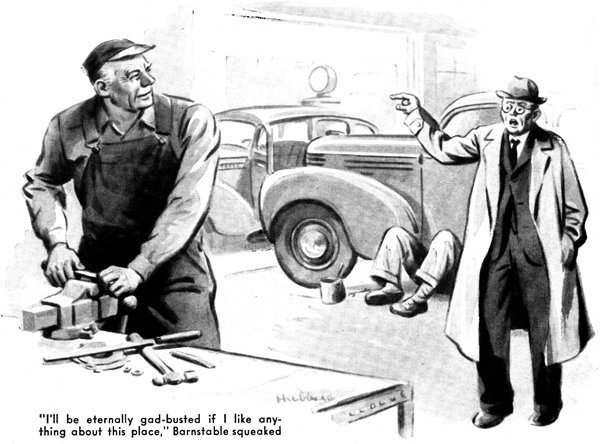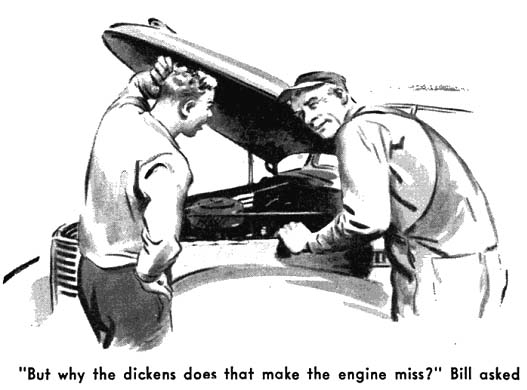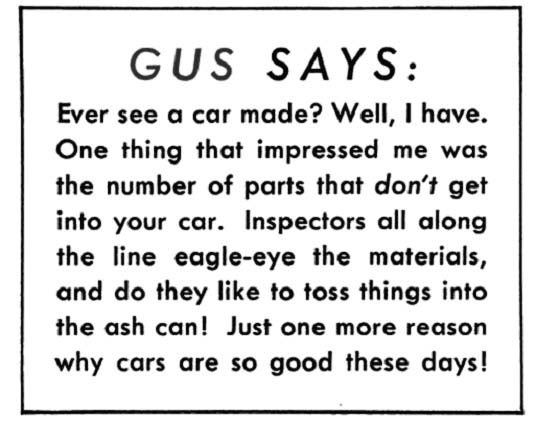April 1941
GUS ALMOST MUFFS ONE
by Martin Bunn

"Hey!" Gus Wilson looked around from the workbench in his Model Garage shop and saw Silas Barnstable standing behind him, the light of conflict in his faded blue eyes and his whole five feet four inches of skinny frame bristling truculence.
"Hey yourself," Gus said mildly. "And how do you like it?"
"I'll be eternally gad-busted if I like anything about this place!" Barnstable squeaked. "Just because I've been foresighted enough to lay by a few dollars don't mean I'm one of these millionaires who like to get skinned. I -- "
Old Silas has been sitting pretty ever since he sold his farm to a building speculator back in the boom days of the Easy-Money-Twenties, but he's a tight old cuss, and he puts up a roar about his Model Garage account regularly each month. "You'd better go in and talk to Joe Clark," Gus suggested pleasantly. "He makes out the bills you know."
"It ain't a bill I'm kicking about this time," Silas told him, "although your bills always are 'way too high. But what I say is, when you charge a man for a job, why don't you do the job right?"
"We aim to do all our jobs right," Gus said. "But we're human, and so once in a while we don't hit the bull's-eye -- and you know mighty well that when we miss we always make good. Just what's biting you, anyhow?"
Silas produced a pipe from his pocket and went through the motions of searching for his tobacco pouch. "Gimme a fill, will you, Gus?" he asked. "I must have gone and left my tobacco home."
Silas never has any tobacco on him -- not when he thinks there's a chance of cadging a pipeful from some one. Gus grinned and handed over his can of "Delight." The old fellow loaded the bowl of his briar, tamping the tobacco down hard with his bony fingers to get as much in as he could. Then he borrowed a match and fired up. "You know how I am," he said after he had taken a few puffs. "When I don't get what I pay for I raise the devil."
"I've noticed that," Gus admitted. "I've also noticed that you usually raise the devil even when you do get what you pay for. Well, what is it now that you think you've paid for and haven't got?"
"Yesterday," Silas explained, "I brought my car in here because the last couple of weeks the motor's been missin' every time I drove over 35 miles an hour. You wasn't here -- gallivantin' around downtown somewheres, I suppose. So I told that new mechanic of yours about it. He run up half an hour time on me foolin' with the motor, and then he says the car's all right -- just needed a little tightenin' up. But it ain't all right. Soon as I get out on the open road and speed up to 35 she starts missin' again. So now, by heck and by gosh, I want . . . "
"All right, all right!" Gus said. "You'll get what you want if it's coming to you."
He raised his voice. "Bill, what work did you do on Mr. Barnstable's car yesterday?"
Bill, the new mechanic, stuck his head out from under the bus he was busy on. "Checked the plugs, distributor, condenser, points, carburetor, and ground strap," he reported. "Tightened up a few connections. Then I tested her out, and there wasn't any miss."
"Road test?" Gus queried.
"Nope," Bill said. "I didn't see any need for one. Engine didn't miss when I speeded her way up."
"I'll have a look," Gus told Silas and led the way out to where the car was parked. He got in and stepped on the starter, then raced the engine. It ran smoothly and evenly. "Hop in," he said to Silas. "We'll go for a little ride."
He drove slowly for a few blocks. The engine still ran smoothly. Then, at the foot of a long and fairly steep grade, he pressed down on the accelerator pedal and watched the speedometer hand. When it got to "35" the engine seemed to miss.
Gus slowed down to 30, and the miss disappeared. He speeded up, and the engine lagged again. And now he noticed something else. "You've got a bad case of shimmy," he told Silas.
"You mean that bouncin' around like, up front?" Silas asked. "That don't do me any hurt -- I ain't a scorcher."
"You ought to have it fixed up," Gus persisted. "You don't have to be a 'scorcher' to be inconvenienced by hard steering and to be put out of pocket by the excessive tire wear caused by a bad shimmy. Well, you're right for once -- your engine misses at 35. Let's go back to the shop and see what's the matter with it."
Back in the shop Gus went over wiring, carburetor, and ignition without finding anything wrong. "That shimmy has something to do with the engine missing," he decided. Let's see now -- "
It took him 15 minutes of careful checking to locate any trouble. The inside ear of the exhaust-manifold flange, which couples to the exhaust pipe, was badly cracked.
Bill scratched his head. "Now what do you think of that!" he exclaimed. "I should have found it, but I didn't. But why the dickens does that make the engine miss?"
"I haven't said it did," Gus replied to his helper. "In fact, I don't think that motor's missing at all."
Bill looked puzzled. "But you tested it . . . "
"All right, I tested it. And I was wrong about the miss," Gus admitted. "Look, here's what happens: That car runs fine up to 35 when two things suddenly go wrong. First, the wheels start to shimmy. Second, the engine speed is just right to shake the motor at the right speed to start the exhaust pipe swinging so that a real crack opens up periodically in that broken flange. That lets some exhaust gas pop out.
"The shimmy tends to slow the car. The popping sounds like a miss. The effect on your ears and other senses is just like that from a missing motor. See?"
Bill astonished, admitted that he saw.
"Hey!" Barnstable snapped. "That's goin' to be an expensive job, ain't it?"
"You needn't worry about that," Gus assured him. "All you'll have to pay for is the work Bill did on your car yesterday. This job is on the shop."
Old Silas looked relieved -- and then a crafty look crept into his face. "I call that fair, Gus -- downright fair!" he said. "And while you're at it, you'll fix up that shimmy of course -- without chargin' me anything extra for it."
"We will -- NOT!" Gus said. "If you want that shimmy fixed you'll have to pay for it."
Barnstable hesitated a long moment. "What'll it cost?" he asked at last.
"Depends on what's the matter," Gus said. "But whatever it costs, it'll be less than wearing out your tires and shaking your car to pieces costs."
"Well, you might as well do it, I suppose," the old fellow said. "But just you remember that I'm a danged good customer of this garage, and that I'm dependin' on you to do the fair thing by me!"
"O.K.," Gus said. "We'll have your bus fixed and ready for you by noon tomorrow."
Bill looked downright embarrassed when Silas Barnstable had gone on his way. "I guess you're thinking I muffed that chance pretty badly," he said to Gus.
Gus grinned consolingly. "I muffed it a bit myself. If I'd just stepped on the gas harder when I thought that car began to miss, I'd have seen where I was wrong at once. Don't let a little thing like that worry you -- you're catching on fine. Always worked in a big shop before this didn't you?"
Bill nodded. "My job was on engines," he explained, "and I always had to stick right to my job, never had much of a chance to learn anything else. Even if I'd road-tested old Barnstable's car I doubt if I'd have clicked on the idea that just a case of shimmy would make his car seem to lose power."
Gus lighted his pipe. "Shimmy'll do quite a few things to a car," he said. "Tell you what -- let's both work on this job of chasing the shimmy out of Silas's wheels. That'll give you a chance to get a line on that sort of work. After we've finished that, you can go ahead by yourself on brazing that manifold ear."
"Swell!" Bill agreed. "But say -- before we start. I know what shimmy is, of course, but what causes it, anyway? And just what does it do to a car?"
Gus tipped his long-peaked cap over his left eye and scratched his right ear. "What's the cause of shimmy? Say, Bill, that's sort of a big order! There are several kinds of shimmy, but the immediate cause of them all is the same -- vibration of the front wheels from side to side or up and down. You always can spot it by a jerky motion of the steering wheel. Now let's -- "
"Hey, wait a minute!" Bill said. "What are these different kinds of shimmy you're talking about?"
"What is this -- a lecture?" Gus demanded. "Well, there's what they call critical-speed shimmy -- it's caused by some part of the steering system vibrating in harmony with some other part of the car, often the engine. That's a mean little devil to chase, but the vibration isn't bad, and it doesn't do any real harm. Then there's low-speed shimmy -- it disappears when you speed up over 30. Sagging springs or something loose in the steering system are the most common causes of that variety.
"And then there's high-speed shimmy -- the kind you get at 35 or over. A lot of things can cause it. Loose wheels or loose steering connections, too much or too little toe-in of the wheels, broken or even weak leaves in the front springs, and shock absorbers that aren't doing their job right are some of them. But I've found that the front tires are the most likely cause -- tires which aren't inflated enough or are inflated unequally, or which throw the front wheels out of balance. So let's have a look at Silas's front tires."
Bill jacked up the front end of the car. Gus began turning one of the wheels -- and started to laugh before he had completed the first turn. Silas Barnstable is no part of a spendthrift, and he never lets a tire go until he has squeezed his full money's worth and a little more of service out of it. Gus pointed to two large vulcanized patches, about six inches apart.
"That one was a push-over, he said. "No use of us looking any further -- there's the cause of this shimmy. I'll bet that each of those patches weighs a couple of ounces."
Bill examined the patches and shook his head doubtfully. "You're right, I suppose," he said, "but I'm darned if I can see how a couple of tire patches can set up enough vibration to do any real harm."
"They can cause shimmy, and wear out your tires, and shake the daylights out of your car," Gus insisted. "I'm not much of a one for triple-jointed words, but it's a matter of centrifugal force. You know how it is when you tie a weight on the end of a piece of string and whirl it around. After you get the weight whirling you can feel a pull on the string, and the faster you whirl the stronger the pull is.
"Well, it's pretty much the same way with a badly out-of-balance tire. Without stopping to figure it out with pencil and paper, I'll bet that those two patches produce a centrifugal force of several pounds when the car is moving along fairly fast. When the patched side of the tire is on top the force is upward, and it makes the wheel bounce upward: when the patched side is at the bottom it makes the wheel bounce downward again.
"But that isn't all of it. When the patched side of the tire is at the front the force is forward, and makes the wheel and the spindle move forward -- and as the spindle is pivoted at the king-pin it makes the wheel run inward: when the patched side is at the rear it makes the wheel run outward.
The result is that the spindle moves around in a small circle, at the same speed and in the same direction as the wheel is turning. And the result of that is that the wheel bounces up and down and runs inward and outward every time it turns -- and that's shimmy."
Bill thought it over for a full minute, and then nodded. "I get you," he said. "Well, next thing is what are we going to do about it?"
Gus took another look at the out-of-balance tire, and then examined the three others.
"Well, he said, "we could fix it up by putting wheel-balance weights on the light side of the patched tire, opposite the patches. But it's past time for Silas to turn the elastic band off his roll and invest in some new rubber. He hasn't got a tire on this bus that I'd ride on! I'll call him up and break the bad news to him. He's a tight, crusty old cuss, but I sort of like him somehow, and I wouldn't want him to break his skinny old neck!"
END

